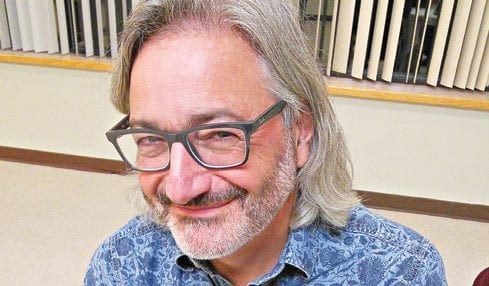Giller Prize winner Gary Barwin visits to read from his novel Yiddish for Pirates
BY SAM PICCOLO Special to the VOICE
Gary Barwin pulled his saxophone from its case, moistened the reed, and hitched the instrument around his neck. He closed his eyes and began to play, his toe tapped to time almost imperceptibly, the pads of the saxophone’s keys clapped against the frame, and there was a gentle hiss of air escaping the mouthpiece just audible beneath the melody. His face filled with strain and reddened. After finishing, to generous applause from the crowd of five, he reached for a glass of water before speaking.
When Barwin had informed the room that he would be opening with a ‘nigun,’ a Jewish religious song, the audience was visibly surprised, though pleasantly so. They had come to the Fonthill branch of Pelham Library last Wednesday evening, after all, to hear Barwin speak of, and read from, his book, Yiddish For Pirates, and it is uncommon to find authors who provide their own musical accompaniment. But it would have been less surprising had the audience known that the writer in front of them was not just ‘Gary Barwin, Giller Finalist,’ but also ‘Gary Barwin, PhD in music composition.’
“My parents paid for all those years of music lessons,” he said. “So I might as well put them to good use.”
Even though he has 19 other books to his name, Yiddish For Pirates is Barwin’s first novel for adults, and it draws from, like his performance at the library, all that he has learned in his 53 years. Barwin’s grandparents were Lithuanian Jews who, sensing a burgeoning hostility, fled for South Africa in the 1920s. His parents grew up there, but left for Northern Ireland in their 20s to avoid participating in Apartheid. Barwin was born in Ulster and lived there until he was nine, when his parents, troubled by The Troubles, finally moved the family to Canada. As Barwin puts it, things have been all right here: “So far.”
This familial theme of perpetual exile is something Barwin tried to capture in Pirates, set in the years around 1492. The protagonist, Moishe, is also a Lithuanian Jew who goes to sea, ending up in Spain during the Inquisition and joining Columbus’ crew, before becoming a pirate in the Americas. Moishe’s parrot Aaron narrates the story, and he ricochets, manically, between Moishe’s entanglements and inevitable expulsions. Barwin’s delight in language is evident in the work, as it filled with lyrical flourishes, and, as the title suggests, Yiddish.
“There’s an old saying,” Barwin said, “that ‘the tongue is not in exile,’ that even when everything else has been lost, a language can remain.”
Yiddish is used in the book to communicate Moishe and Aaron’s capacity to resist their displacement, but also to disorient readers not fluent in the language. Though Barwin himself does not speak Yiddish (he developed word lists and consulted with experts to ensure accuracy), writing Pirates was an opportunity to crib countless stories from his Jewish heritage. Though Moishe has, by the book’s end, been separated from his betrothed Sarah for many years, Aaron suggests that Moishe might return to protect her, since he had promised to do so decades before. Barwin took this idea from a friend of his parents, who procured a Swedish passport for his ex-wife and her mother while they were being crammed into cattle cars bound for a camp. Though they had divorced, he risked his own life to save theirs because he had sworn an oath to protect his wife, an oath no separation could affect. Barwin wiped his eyes after finishing the story. “It makes me… the proper word is ‘verklempt.’”
Ten of Barwin’s other 19 books are of verse, and he retains a poetic playfulness in his prose. Aaron is incessantly making puns in Pirates. Searching for gold, Columbus’ crew is directed toward the Carib peoples. “Oh, and by the way,” Aaron tells us, “the Caribs are the people who eat people. You can pick your friends. And you can pick your teeth. And you can pick your friends from your teeth.”
Many of these puns are Jewish ones, too, including “Pochahontowitz,” a play on “Pocahontas,” which Barwin’s son suggested. Pirates nods to weightier works as well, including those of Plato, Machiavelli, and T.S Eliot. He said: “I can steal from my son, and I can steal from Dostoyevsky.”
When it was time to read, Barwin picked up his book and opened it to the beginning. He shook back his shoulder-length hair, which is near uniformly grey, and rubbed a hand across his short-cropped beard, which, although salting too, retains enough pepper to sneeze at. Barwin gestured animatedly as he spoke, putting on a gruff brogue for a sailor’s lines and seeming unbothered by the thinness of the audience, made up entirely of book-club-aged women. He read three passages, ending with a scene of “gay Yiddish parrot sex” that, he said, any writer who has written such a passage is obliged to read.
Barwin, who lives in Hamilton, took four years to write Pirates, and says of his wife, Beth Bromberg, “this book––as most things––would simply not be possible without her.” Bromberg is a lawyer, and when the two became engaged, his parents thanked him “for marrying the person we’d always hoped you’d become.” Bromberg’s family is Jewish, too, and Barwin takes great pride that his father-in-law, who left school after ninth grade, read and loved the book.
“The Giller prize and all that, it’s great, but I like it when real people just come to me and talk about what the book meant for them,” Barwin said.
“I think that it’s for everyone, since, the question for us is, am I the same as someone in 1492? Do I love my children the same way? The answer is both yes and no. But I’m trying to figure out just how much.”



